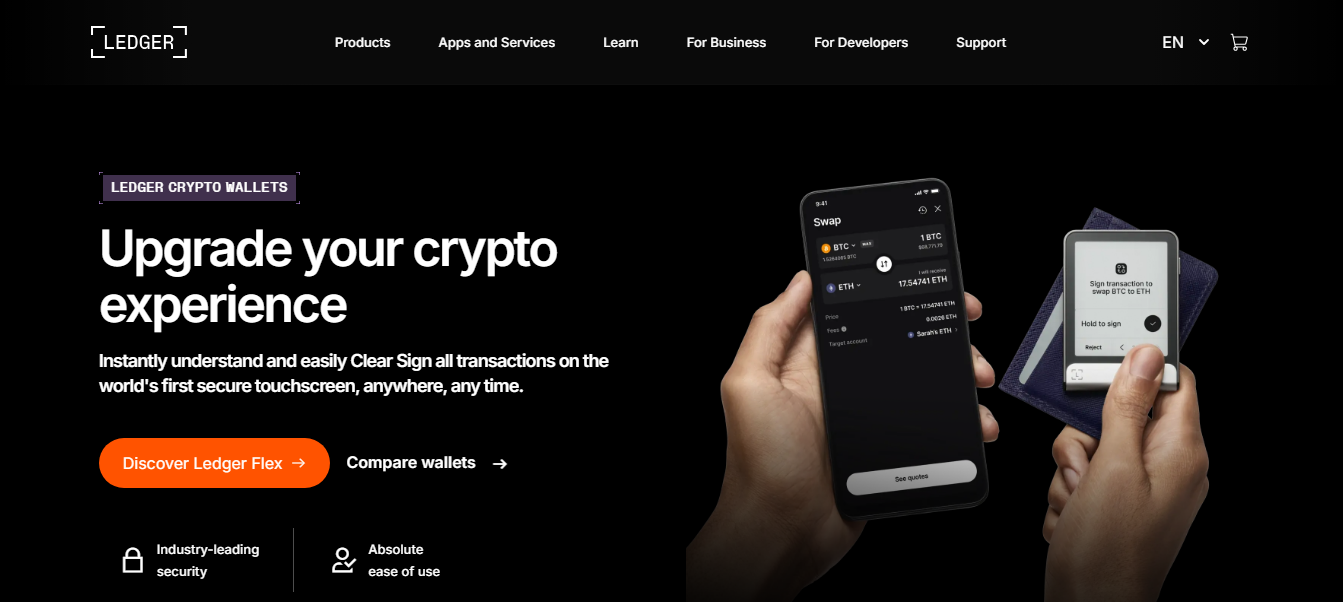✨ Made with Daftpage

Ladger.com/start is the official starting point for anyone looking to set up and use a Ledger hardware wallet. Ledger devices, such as the Ledger Nano X, Ledger Nano S Plus, and Ledger Stax, are physical devices designed to store cryptocurrency private keys securely offline. Unlike software wallets, which keep private keys on a computer, phone, or online server, Ledger wallets store keys in a secure chip within the device. This offline storage ensures that private keys are protected from hacking, malware, and phishing attacks. Using a Ledger wallet gives users full control over their cryptocurrency while maintaining strong security. Ledger is widely trusted worldwide and is a popular choice for both beginners and experienced cryptocurrency users.
When a Ledger device arrives, it is important to check the package carefully. A genuine Ledger package includes the wallet device, a USB cable, recovery sheets, and a quick start guide. Ledger devices never come with a pre-written 24-word recovery phrase. If a device arrives with a recovery phrase already generated, it may have been tampered with and should not be used. The recovery phrase must always be created directly on the device to ensure security. This 24-word recovery phrase is the only backup for the private keys stored on the device. Anyone with access to it can control all funds, so it must be kept offline, safe, and confidential. Never store it digitally or share it with anyone.
To begin setup, open a web browser and navigate to ladger.com/start. Entering the URL manually ensures that you reach the official website and avoid phishing scams. On the page, select your Ledger device and download Ledger Live, the official software for managing Ledger wallets. Ledger Live is available for Windows, macOS, Linux, iOS, and Android. It allows users to view balances, send and receive cryptocurrencies, install blockchain apps, and monitor transaction history, all while private keys remain securely stored on the Ledger device.
After downloading Ledger Live, install the software and open it. Click “Get Started” and choose whether to set up a new device or restore an existing wallet using a recovery phrase. For first-time users, select “Set up as new device.” Connect the Ledger device to your computer using the supplied USB cable, or via Bluetooth if using a Ledger Nano X. Follow the instructions carefully on both the Ledger device and Ledger Live, as these steps ensure that the setup is secure.
The first step during setup is creating a PIN code. The PIN protects your wallet from unauthorized access. Choose a PIN that is memorable for you but difficult for others to guess. The PIN must be entered every time the device is accessed. Entering the wrong PIN multiple times will trigger a factory reset, which prevents unauthorized attempts to access the wallet.
Next, the device generates a 24-word recovery phrase. This phrase serves as the backup for all private keys stored on the wallet. If the device is lost, stolen, or damaged, the recovery phrase allows users to restore their wallet on a new Ledger device. Carefully write down all 24 words in the exact order on the recovery sheet provided. Never photograph it, store it digitally, or share it. Once recorded, confirm the recovery phrase on the device to ensure it has been written correctly. This step is essential because the recovery phrase is the only way to restore access to your funds.
Once setup is complete, open Ledger Live and connect the device. Ledger Live will verify the device’s authenticity and prompt any firmware updates. Updating firmware is important for maintaining security and gaining access to new features. Users can then install apps for each cryptocurrency they plan to use. Each blockchain requires a separate app, such as Bitcoin, Ethereum, or Solana. Apps are installed via the “My Ledger” section in Ledger Live. After installing apps, users can add accounts for each cryptocurrency. Ledger Live displays balances and transaction history, while private keys remain securely stored on the device.
To receive cryptocurrency, select “Receive” in Ledger Live, choose the account, and verify the address on your Ledger device. Always ensure that the address shown in Ledger Live matches the one displayed on the device. To send cryptocurrency, click “Send,” enter the recipient’s address and the amount, and confirm the transaction on the device. Physical confirmation on the device provides an additional layer of security, preventing unauthorized transactions even if your computer or phone is compromised.
For long-term security, never share your PIN or recovery phrase. Only download Ledger Live from the official website, ladger.com/start. Store your recovery sheet in a secure, fireproof, and waterproof location. Regularly update both Ledger Live and the device firmware to maintain optimal security. If a Ledger device is lost, stolen, or damaged, users can restore their wallet on a new Ledger device using the 24-word recovery phrase. Cryptocurrency is stored on the blockchain, not on the device, so funds remain recoverable as long as the recovery phrase is secure.
Ladger.com/start provides step-by-step guidance for each stage of setup, from downloading Ledger Live and creating a PIN to recording the recovery phrase, installing apps, and adding accounts. Following these instructions ensures wallets remain secure, private keys stay protected, and cryptocurrency holdings are safe. Ledger devices allow users to manage digital assets confidently, knowing private keys are offline, fully under their control, and protected from online threats. By following the guidance on ladger.com/start, users can safely manage cryptocurrency while maintaining complete control over their funds, following the principle “not your keys, not your coins.”